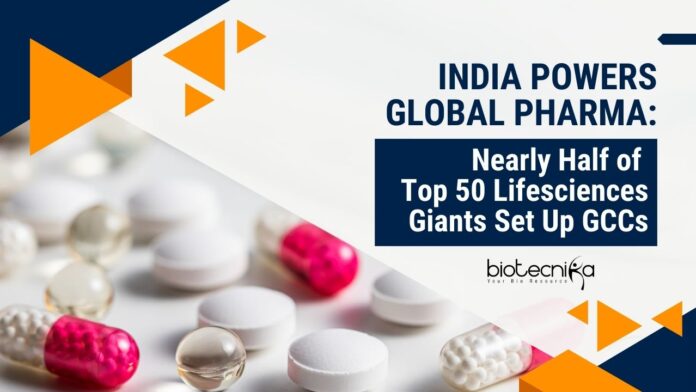India Powers Global Pharma: Nearly Half of Top 50 Lifesciences Giants Set Up GCCs
India is rapidly establishing itself as a global hub for the pharmaceutical and life sciences industries. According to recent developments, it has been observed that 23 of the world’s top 50 life sciences companies now operate Global Capability Centres (GCCs) in the country, with most having set up shop within the last five years.
This surge is more than just numbers; it reflects a shift in how multinationals view India. Rather than serving as low-cost support centers, Indian GCCs are evolving into strategic and innovation-driving entities. They now play pivotal roles in drug discovery, digital therapeutics, real-world evidence (RWE) analytics, and AI-powered, patient-centric solutions.
Growth by Decade: A Timeline of India’s GCC Evolution
- 2000–2010: In the early times, adopters like Teva, Novartis, AstraZeneca, Mylan, and Johnson & Johnson established GCCs in India. These companies mainly focused on R&D support, regulatory assistance, and clinical operations.
- 2010–2020: Companies such as Thermo Fisher, Merck, Eli Lilly, Sanofi, and Boston Scientific broadened their activities, building multifunctional GCCs covering global business services, IT, analytics, and innovation
- Since 2020, the momentum has accelerated, with Abbott, Viatris, Siemens Healthineers, and HCA Healthcare launching advanced centers focused on digital transformation, AI diagnostics, next-generation supply chains, and enterprise technology.
Various notable investments underscore this trend:
- Sanofi is expanding its Hyderabad GCC with a ₹400 million investment. They are primarily aiming to double their workforce and anchor it as its largest AI-powered global hub for R&D, manufacturing, and commercial operations
- Bristol Myers Squibb has launched a $100 million innovation hub in Hyderabad. They have employed over 1,500 specialists in drug development, IT, and digital services.
- Amgen is investing $200 million in Hyderabad to build digital and AI capabilities, advance its medicines pipeline, and extend opportunities for local talent
A Transformation in Function: From Support to Strategic Partner
The modern GCC in India now spans the entire life sciences value chain. They oversee core capabilities, including clinical trial operations, pharmacovigilance, regulatory affairs, biostatistics, drug discovery, and commercial operations, along with critical enabling functions like finance, HR, IT, analytics, and supply chain
The analysis given by EY reveals significant penetration in these functions over the past five years:
- Enabling functions: Finance (70%), HR (75%), Supply Chain (62%), IT (67%)
- Core functions: Drug Discovery & Development (45%), Regulatory Affairs (60%), Medical Affairs (54%), Commercial Operations (50%)
Arindam Sen, Partner and GCC Sector Leader at EY India, stated that this isn’t about cost arbitrage anymore; it’s about India becoming indispensable to the global R&D pipeline. Pharmas are embedding their most strategic, knowledge-intensive work here, making India the epicentre for life sciences innovation, compliance, and future growth.
Why India?
Several forces are propelling this transformation:
- Talent Pool & Scale: India boasts over 2.7 million life sciences professionals. Each year, more than 2 million STEM graduates and over 110,000 medical graduates join this talent ecosystem.
- Supportive Policy Environment: Both central and state governments have eased norms and offered incentives, such as investment subsidies, rental assistance, skilling programs, and land rebates, to attract GCCs
- Robust Ecosystem: India’s mature network of academic institutions, contract research organizations (CROs), vibrant startups, and unicorns fosters collaboration and innovation
- Infrastructure Advantage: The availability of Grade A commercial spaces in metros and tier II/III cities ensures that GCCs can scale efficiently and cost-effectively
Through strategic investments and a rapidly maturing ecosystem, India powers global pharma and has transitioned from being a low-cost support hub to the global innovation engine for the life sciences industry. With nearly half of the top firms anchoring GCCs here and deepening functional capabilities, India is charting a forward-looking path toward sustainable leadership in global R&D and healthcare innovation.























